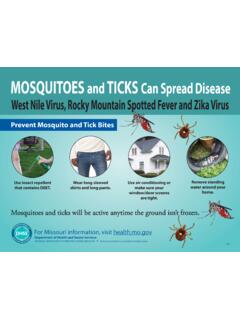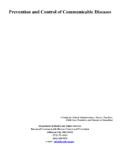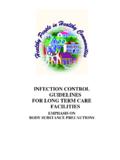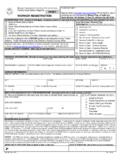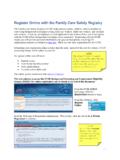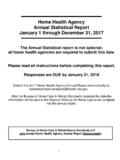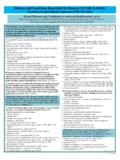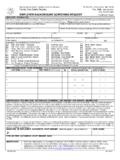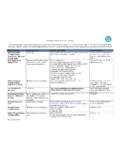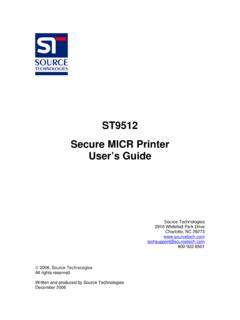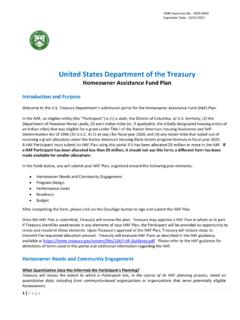Transcription of Home and Community Based Services Manual
1 PERSONAL CARE ASSISTANCE - STATE plan (CONSUMER-DIRECTED MODEL) Page 1 of 7 1/ 18 Home and Community Based Services Manual POLICY Personal Care Assistance - (Consumer-Directed Model) (CDS) Services provide assistance with activities of daily living (ADL) and/or instrumental activities of daily living (IADL) provided as an alternative to nursing facility placement to persons with a physical disability. Authorization of CDS is funded through both the Medicaid State plan and the Independent Living Waiver (ILW). This policy addresses State plan Services only; refer to Policy for additional information regarding Services through the ILW. All CDS participants must meet the following eligibility criteria: At least 18 years of age; Be physically disabled, as defined by 19 CSR ; Loss of, or loss of use of, all or part of the neurological, muscular or skeletal functions of the body to the extent that the person requires the assistance of another person to accomplish routine tasks.
2 Be able to self-direct their own CDS ( see guidelines below); In active Medicaid status (see Policy ); Participants who are eligible for Medicaid on a spenddown basis may be authorized to receive CDS during periods when they meet their spenddown liability. During periods when the participant has not met their monthly spenddown liability amount, the participant and provider may make a private arrangement for the continued delivery of Services . In these instances, the participant is responsible for the cost of Services received. Participants who receive Medicaid due to eligibility for Blind Pension (BP) (see Policy , Appendix 3) may be authorized for CDS. Participants in a Transfer of Property penalty may be authorized for CDS.
3 Authorization of CDS does not meet the requirements for an individual to be eligible for Home and Community Based (HCB) Medicaid. Have an appropriate Medicaid Eligibility (ME) code (see Policy , Appendix 3); and Meet nursing facility level of care (LOC). CDS shall be authorized in 15 minute units. CDS shall be included in the overall cost of care for the participant (see Appendix 2). CDS shall not exceed 60% of the average statewide monthly cost for care in a nursing facility; including when authorized in combination with other State plan Home and Community Based Services (HCBS) such as, Personal Care (PC), Advanced Personal Care (APC), and Authorized Nurse Visits (RN). The combination of CDS and agency model PC shall not exceed 60% of the average monthly cost for care in a nursing facility, regardless of any other Services authorized.
4 PERSONAL CARE ASSISTANCE - STATE plan (CONSUMER-DIRECTED MODEL) Page 2 of 7 1/ 18 Home and Community Based Services Manual NOTE: The cost of RN visits are not included in the 60% of the average statewide monthly cost for care in a nursing facility restriction for basic personal care. When the combination of CDS, other State plan Services , and a Home and Community Based Waiver ( , Aged and Disabled Waiver (ADW), Independent Living Waiver (ILW)) Services exceed the cost maximum by the cost of the Waiver Services : The appropriate supervisor for the Division of Senior and Disability Services (DSDS) staff shall review all person centered care plan (PCCP) requests over the 100% cost cap to ensure the participant s unmet needs require the amount of service requested.
5 If documentation supports the request, the case shall be forwarded to the Bureau of Long Term Services and Supports (BLTSS) for consideration and approval prior to authorization over 100% of the cost cap. Pending the approval from BLTSS to exceed the cost cap, CDS in combination with other State plan or ADW Services can be authorized up to 100% of the cost cap, excluding PC and/or CDS which may never exceed 60% of the cost cap. NOTE: When a person centered care plan (PCCP) includes Adult Day Care authorized through the Aged and Disabled Waiver or the Adult Day Care Waiver, the total cost of care cannot exceed 100% of the cost cap. Pursuant to federal guidelines, a participant can only be enrolled in one Home and Community Based Waiver at a time, regardless of who is administering the Waiver program.
6 Determination of Ability to Self-Direct A current or potential CDS participant is required to have the ability to direct his/her own care per Section (4), RSMo. Section (2), RSMo defines consumer-directed as the hiring, training, supervising, and directing of the personal care attendant by the consumer. Section , RSMo states that current or potential participants must be able to fulfill the following responsibilities: Supervise the personal care attendant; Verify the wages to be paid to the personal care attendant; Prepare and submit time sheets, signed by both the participant and personal care attendant; Notify DSDS or its designee of any changes in circumstances affecting the CDS PCCP or in the participant s place of residence; and Report any problems resulting from the quality of Services rendered by the personal care attendant to the participant s provider or to DSDS or its designee, if the matter can t be resolved through the provider.
7 PERSONAL CARE ASSISTANCE - STATE plan (CONSUMER-DIRECTED MODEL) Page 3 of 7 1/ 18 Home and Community Based Services Manual Determinations that a potential participant requesting CDS does not have the capability of directing his/her own care or cannot fulfill the responsibilities of a CDS participant must be documented and/or attached in the HCBS Web Tool. Examples of documentation may include, but are not limited to: An individual with a guardian or conservator cannot be rejected for CDS solely for that reason. Explanation of the potential participant s cognitive inabilities which was a factor in the determination of an individual's need for a guardian or conservator can provide reason to reject for lack of ability to self-direct care.
8 DSDS or its designee shall obtain, as required, copies of the petition that resulted in the appointment of a guardian and/or conservator, the medical evidence submitted in that case, and the appointment order. These efforts shall include contact with the court system, the current or potential participant being referred, the person referring the individual for Services , family members of the individual, and/or the guardian or conservator. Statements or medical records from the current or potential participant s healthcare professional that document any functional limitations of the individual that support the individual is not capable of self-direction. The Healthcare Professional Inquiry, Appendix 13, shall be utilized for this purpose when there are concerns regarding the current or potential participant s ability to self-direct.
9 The response received from the Healthcare Professional Inquiry shall be documented in Case Notes and uploaded to the HCBS Web Tool. Responses, which need further clarification, from the current or potential participant to questions presented during the assessment process, as well as additional questions listed in Chapter , Appendix 10 as documented in the Case Notes. If Chapter , Appendix 10 is utilized, answers to the questions shall be an exhibit if the current or potential participant appeals the decision that he/she lacks the ability to self-direct Services . Questions are to be posed to the current or potential participant . If another individual responds on behalf of the current or potential participant , this must be documented in the Case Notes.
10 Completion of the St. Louis University Mental Status (SLUMS) exam (see Chapter , Appendix 8) may be utilized when there is a concern regarding an individual s ability to self-direct. The instructions to this policy provide background information on the SLUMS exam, clarifies when the exam shall be utilized, and defines further evaluation which must be pursued. Once a thorough review of all available information has taken place which determines the current or potential participant cannot self-direct Adverse Action procedures shall be followed (see Chapter 5). PERSONAL CARE ASSISTANCE - STATE plan (CONSUMER-DIRECTED MODEL) Page 4 of 7 1/ 18 Home and Community Based Services Manual If a current or potential participant is determined to be unable to self-direct, DSDS or its designee shall advise that individual and/or the authorized representative of the other available options.
